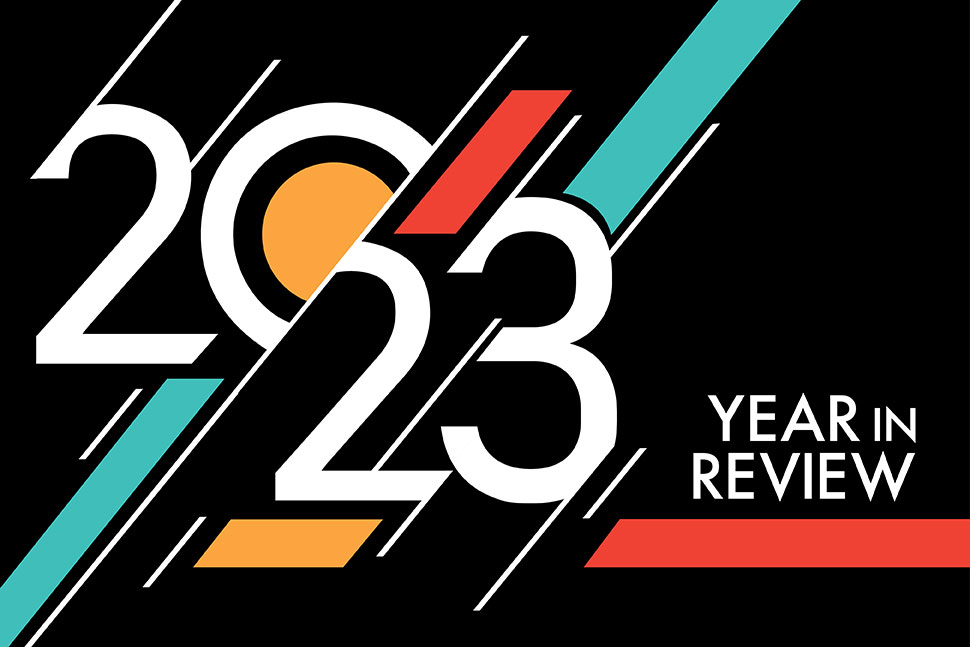2023 Year in Review

Another record year for book challenges

Preliminary data from the Office for Intellectual Freedom (OIF) through August 31 showed a 20% increase in reported book challenges for 2023—surpassing the record set in 2022. The data also showed an increase in challenges that targeted multiple titles, with libraries in 11 states receiving challenges that included 100 or more books. These challenges targeted 1,915 different titles, most of which are books written by or about people of color or LGBTQIA+ people.
Illinois passes law designed to deter book bans
On June 12, Illinois Gov. J. B. Pritzker signed into law a bill that would withhold state funds for libraries that remove books for partisan reasons or refuse to adopt ALA’s Library Bill of Rights or similar language. The law, which goes into effect January 1, 2024, is considered the first of its kind in the nation, although California passed a similar bill covering schools in September.
State libraries cut ties with ALA
![]() Amid the national fight over book bans, state libraries in Missouri, Montana, South Carolina, and Texas withdrew their memberships from ALA. Conservative lawmakers in several other states have called for the same. Some states cited ALA’s stance on book challenges and bans, while others took issue with a 2022 tweet made by ALA President Emily Drabinski.
Amid the national fight over book bans, state libraries in Missouri, Montana, South Carolina, and Texas withdrew their memberships from ALA. Conservative lawmakers in several other states have called for the same. Some states cited ALA’s stance on book challenges and bans, while others took issue with a 2022 tweet made by ALA President Emily Drabinski.
Freedom to Read Statement turns 70
On June 25, ALA celebrated the 70th anniversary of its Freedom to Read Statement by calling on publishers, authors, libraries, and others in the book community to join a list of signatories in affirming their commitment to this guiding document. Hundreds signed on to the statement, which begins: “The freedom to read is essential to our democracy.”
Libraries launch book ban workarounds
To help circumvent book bans, several libraries made digital titles available beyond their service areas. In 2023, a few joined Books Unbanned, an initiative launched the prior year at Brooklyn (N.Y.) Public Library. The program allows young adults nationwide to borrow ebooks from participating libraries. The Digital Public Library of America debuted its Banned Book Club geotargeted app (pictured), allowing users to borrow titles banned in their area. And ALA joined the “Books for All” campaign from New York Public Library to offer free digital access to Teen Banned Book Club picks.
Intellectual freedom enters the courtroom
Many libraries, booksellers, and publishers—as well as ALA’s Freedom to Read Foundation and other advocates—joined lawsuits against book bans, alleging they violate First Amendment rights. They supported litigation efforts in Arkansas, Florida, and Texas that aimed to restrict or remove access to books. One notable decision was in Llano County, Texas, in which several community members sued the local government over book removals and won in district court. A county commission vote to close the library following the ruling was unsuccessful.
Bomb threats in libraries across the country

A rash of bomb threats against public and school libraries intensified this year, forcing some libraries and schools to temporarily close their doors. These threats included facilities in California, Illinois, Iowa, and Oklahoma, among others. In many cases, these threats appear to be linked to book challenges and objections to programming and displays that reflect the experiences of BIPOC and LGBTQ+ people.
Obama writes open letter to librarians

On July 17, former President Barack Obama published an open letter to US librarians in an era of increasingly frequent book challenges and sometimes politically motivated, highly personal attacks against those who resist them. The letter, which addressed librarians, read in part: “In a very real sense, you’re on the front lines—fighting every day to make the widest possible range of viewpoints, opinions, and ideas available to everyone.”
Evolving services for incarcerated readers
The new Standards for Library Services for the Incarcerated or Detained were approved this past summer at ALA’s 2023 Annual Conference and Exhibition in Chicago. The document is the first update to the original standards published in 1992, expanding their scope and recognizing the full continuum of incarceration. In April, US Rep. Emanuel Cleaver II (D-Mo.) introduced the Prison Libraries Act of 2023, which, if passed, would provide $60 million over six years to update materials and hire librarians in correctional institutions.
Authors push back on AI
The Authors Guild and 17 authors, including George R.R. Martin and Jodi Picoult, filed a class-action lawsuit in September against OpenAI, the company behind the AI-powered chatbot ChatGPT. The suit claims that the authors’ copyright was violated when the company used their works as part of the data set used to train ChatGPT. The lawsuit is ongoing as of late November.
Natural disasters continue to strike libraries

Climate change drastically affected libraries and their communities, with 2023 marking the hottest year on record globally. In the US, a category EF-4 tornado damaged Mississippi libraries in March, historic flooding shuttered several libraries across Vermont in July (pictured), and deadly wildfires on Hawaii’s island of Maui destroyed libraries in August.
Court decision restricts Internet Archive book lending
In Hachette v. Internet Archive (IA), the US district court for the Southern District of New York granted an injunction in August against IA’s lending of digitized copies of in-copyright books. These titles were available through IA’s Open Library and National Emergency Library projects. The injunction includes only books otherwise available in electronic format, and IA can still provide access via interlibrary loan and to people with qualified print disabilities. IA intends to appeal the decision.

Library programs, services meet needs
In a year of adversity, library workers remained steadfast in their support of patron needs. Community fridges, medical wellness kits (pictured), and free hygiene packages equipped patrons and students with necessities. Debate clubs, teen artist-in-residence programs, and gender-affirming closets provided means for self-expression. And Wi-Fi benches, cellphone lending programs, and home deliveries for new parents kept people connected.
Simon & Schuster sold to private equity firm
In August, entertainment and media company Paramount announced it had sold Simon & Schuster to private equity firm KKR. The $1.6 billion deal came months after a federal judge blocked a sale to Penguin Random House, a rival Big Five publisher, citing further consolidation of the book publishing industry. KKR also owns OverDrive, a leading provider of digital content to libraries.
FCC offers grants to promote Affordable Connectivity Program
On March 10, the Federal Communications Commission (FCC) announced $66 million in grants to fund projects that promote its Affordable Connectivity Program (ACP) through partner organizations across the US. ACP provides discounted internet services for eligible households and households on qualifying tribal lands. Libraries are eligible to apply for outreach grants, which offer funding and resources to help increase participation in ACP and reach historically underserved communities.
Hall resigns

Tracie D. Hall announced in early October that she was stepping down as ALA executive director. Hall had been in the role since February 2020, joining two weeks before COVID-19 was declared a pandemic. During her tenure, she helped secure the largest unrestricted grants in ALA’s history. For her service and efforts, Hall received numerous recognitions and awards, including a Lifetime Achievement Award from the National Book Foundation in 2022—becoming only the second librarian to receive the honor—and was on Time magazine’s 2023 TIME100 list.
Source of Article